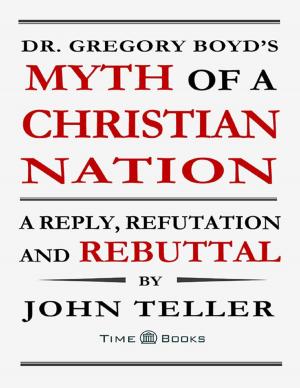Christian Pacifism and Just War Theory: Discipleship and the Ethics of War, Violence and the Use of Force
Religious Studies, #2
Nonfiction, Religion & Spirituality, Theology, Christianity| Author: | Harold Palmer | ISBN: | 9781681090337 |
| Publisher: | TellerBooks | Publication: | June 1, 2016 |
| Imprint: | Language: | English |
| Author: | Harold Palmer |
| ISBN: | 9781681090337 |
| Publisher: | TellerBooks |
| Publication: | June 1, 2016 |
| Imprint: | |
| Language: | English |
What did Jesus mean when he said to “love your enemies” and “pray for those who persecute you”? Do these commandments leave room for Christians to serve in militaries or police forces that implement the use of force? Or is the Christian to steadfastly reject violence and embrace pacifism? Are certain wars justified on the basis of just war theory, or are all wars, in their brutality and destruction, inherently evil?
In this study, Harold Palmer, an attorney, examines the case that has traditionally been made to justify Christian participation in war. The author begins with a historical background of the roots of just war theory as promulgated by Thomas Aquinas. He then examines the passages on which just war theorists rely, including God’s commandments to the Israelites to go to war against their enemies, Jesus’ praise of the Roman Army centurion for his faith and God’s use of the centurion Cornelius to graft Gentiles into the Kingdom of God. Arguing that these passages have been misunderstood, he concludes that Christianity only permits a single response to evil—self-sacrificial love.
The author makes a cogent case for Christian pacifism by examining the life of Jesus and arguing that His crucifixion was more than a salvific act; it also exemplified the ideal of Christian living. Being a disciple of Jesus means emulating Him in every way, including responding to violence through self-sacrificial love, as Jesus did, and obeying Jesus’ commands to be as “harmless as doves,” to “turn the other cheek” and “pray for those who persecute you.”
Finally, this study tackles the difficult question of Old Testament violence by arguing that it falls within a specific context and is not normative for members of the New Covenant of Grace. Rather than embrace violence, we are to follow the examples set by the early church and its martyrs, including the Apostle Stephen, who prayed that his persecutors not be charged with their sins, and the apostle Paul, who taught us to “live peaceably with all men.” Our war is not a physical struggle, but a spiritual war to be waged with prayer, faith and the gospel of peace (Eph 6:12-18).
About the author. Harold Palmer is an attorney who served nearly two decades at the United Nations, before retiring to rural New York to dedicate himself to the study of philosophy and theology.
What did Jesus mean when he said to “love your enemies” and “pray for those who persecute you”? Do these commandments leave room for Christians to serve in militaries or police forces that implement the use of force? Or is the Christian to steadfastly reject violence and embrace pacifism? Are certain wars justified on the basis of just war theory, or are all wars, in their brutality and destruction, inherently evil?
In this study, Harold Palmer, an attorney, examines the case that has traditionally been made to justify Christian participation in war. The author begins with a historical background of the roots of just war theory as promulgated by Thomas Aquinas. He then examines the passages on which just war theorists rely, including God’s commandments to the Israelites to go to war against their enemies, Jesus’ praise of the Roman Army centurion for his faith and God’s use of the centurion Cornelius to graft Gentiles into the Kingdom of God. Arguing that these passages have been misunderstood, he concludes that Christianity only permits a single response to evil—self-sacrificial love.
The author makes a cogent case for Christian pacifism by examining the life of Jesus and arguing that His crucifixion was more than a salvific act; it also exemplified the ideal of Christian living. Being a disciple of Jesus means emulating Him in every way, including responding to violence through self-sacrificial love, as Jesus did, and obeying Jesus’ commands to be as “harmless as doves,” to “turn the other cheek” and “pray for those who persecute you.”
Finally, this study tackles the difficult question of Old Testament violence by arguing that it falls within a specific context and is not normative for members of the New Covenant of Grace. Rather than embrace violence, we are to follow the examples set by the early church and its martyrs, including the Apostle Stephen, who prayed that his persecutors not be charged with their sins, and the apostle Paul, who taught us to “live peaceably with all men.” Our war is not a physical struggle, but a spiritual war to be waged with prayer, faith and the gospel of peace (Eph 6:12-18).
About the author. Harold Palmer is an attorney who served nearly two decades at the United Nations, before retiring to rural New York to dedicate himself to the study of philosophy and theology.















